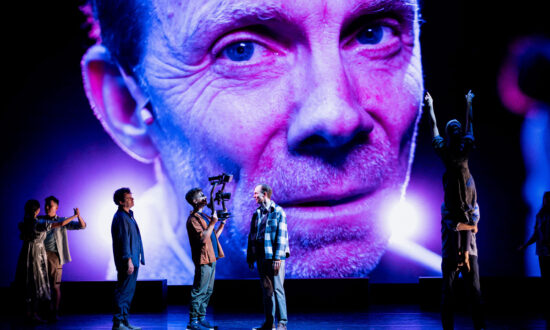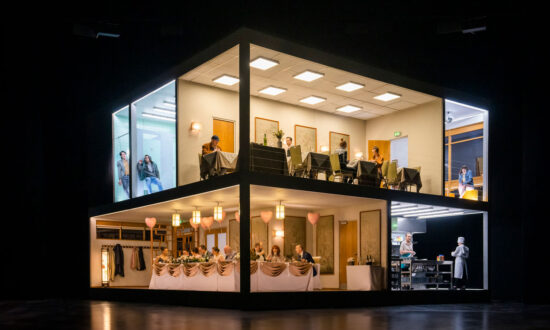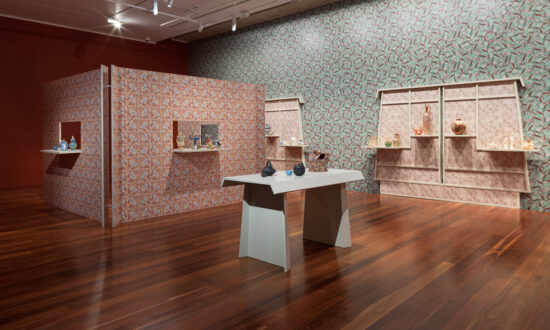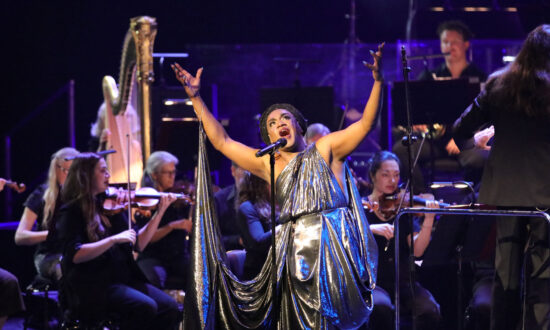Kristallnacht – or Night of Broken Glass – took place on November 9-10 in 1938 and was a series of attacks against Jewish people that saw the smashing of shops, businesses and synagogues across Germany. Some 30,000 Jews were rounded up and more than 90 died.
The world reacted with stunned silence and leaders were slow to denounce the violence, but here in Australia one man boldly led his own demonstration against Kristallnacht through the streets of Melbourne.
Then in his late 70s, and having campaigned relentlessly during his life for Aboriginal rights, William Cooper and members of the Australian Aborigines League walked from Footscray to the steps of the German Consulate to deliver a letter condemning the Nazi government for its “cruel persecution of the Jewish people”.

Activist William Cooper.
So moved were composer Nigel Westlake and singer-songwriter Lior (aka Lior Attar) in learning about this event that they set about honouring Cooper in a song cycle entitled Ngapa William Cooper – with Ngapa meaning “Grandfather” in Yorta Yorta.
It follows their first combined work, Compassion, which explored themes of human understating and wisdom via ancient Hebrew and Arabic poetic texts. A recording of that wonderful, rapturous work by the Sydney Symphony Orchestra won the ARIA Award for Best Classical Album in 2014.
Westlake and Lior later presented a chamber version of Compassion at UKARIA for the 2018 Adelaide Festival, and their new song cycle follows very much in its footsteps. Written for the same combination of voice, string quartet, piano, double bass and percussion, Ngapa William Cooper will be premiered at this year’s Festival, at UKARIA on March 5 and the Adelaide Town Hall on March 7.
Lior recounts how he and Westlake began searching for a real-life story that could embody “all the beautiful philosophy” that was wrapped up in Compassion. They discovered it in the remarkable biography of William Cooper.
“What an amazing story: an Indigenous man who doesn’t have his own rights, chooses to protest against the persecution of a people on the other side of the world – and it’s the only private protest anywhere in the world that is known against Kristallnacht,” he tells InReview.
Sadly, though predictably, Cooper’s protest letter came to nothing: the German Consulate refused him entry. But on the 80th anniversary of Kristallnacht in 2018, a re-enactment of his march took place with his grandson, Uncle Alf (Boydie) Turner, presenting the Consulate with a facsimile. In response, the German Government issued an apology praising Cooper’s courage and commitment to justice.
Lior says that hearing about this historic re-enactment through his cousin, who was working at the time at the Melbourne Holocaust Museum, sparked his immediate interest.
“The more I looked into it, and in speaking to family members of William Cooper, the more I was completely blown away by the importance and poignant nature of this story. I just thought, this is an iconic moment in Australian history that needs to be told. And that’s where it started.”
Lior and Westlake’s interest was kindled further in finding out that Cooper was involved in music. Having been relocated from his tribal lands to settle in the Maloga Mission on the Murray River (near Echuca) in his early teens, he took part in congregational hymn singing there. But Cooper’s musical experiences were to extend well beyond that.
“We believe that he was a violinist who actually performed on a number of occasions,” says Westlake.
“We also know that he was very moved by a performance of the Fisk Jubilee Singers, a group of traveling gospel singers [from Nashville in the US] who came to the mission and apparently formed a relationship with the people there. Several of the songs that the Fisk Singers performed were adopted by the community and translated into Yorta Yorta language.”

Music collaborators Nigel Westlake and Lior. Photo: Craig Abercrombie
It is known that the Fisk Jubilee Singers sang a repertoire of “slave songs” at Maloga when Cooper was still there in his late 20s, and that he may have learned one of these – “Brother Moses”, or Burra Ferra in Yorta Yorta. Passed down through generations, it is about the Jews escaping the Pharaohs’ oppressive regime.
“Obviously William Cooper put a strong emphasis on the power of music, in that he could see its benefit to his community,” says Lior.
As Ngapa William Cooper gradually took shape, Lior and Westlake enlisted Sarah Gory to help with the narrative content. An expert on the activist’s life and an experienced writer of both fiction and non-fiction, she worked closely with Lior forming the song cycle’s lyric content.
“It was great to partner up lyrically with someone who had such an in-depth understanding of the story and of the man himself,” he says.
Also invited into the process was Lou Bennett, the much-respected Indigenous singer-songwriter and language activist. Herself a direct descendant of Cooper, she was entrusted with writing the lyrics in his native tongue.
Bennett’s input proved so valuable that she ended up contributing many of the melodies as well, says Lior.
“Nigel and I very quickly realised that when she had the language in front of her, we just needed to let her have the creative freedom to compose, and it was so much better. So in the end, every time we wanted her to contribute some Yorta language, we let her compose the melody.
“Lou is a beautiful singer and artist, so all the boxes were ticked there.”
As with Compassion, Westlake’s role was then to compose an enveloping score that projects the melodies and makes full use of the virtuosic capabilities of the performers on hand – in this case the Australian String Quartet joined by New York-based Australian pianist Andrea Lam, double bassist Kees Boersma and percussionist Rebecca Lagos (the latter pair from the Sydney Symphony Orchestra).
to my ears at least, it is a cinematic kind of experience
Westlake describes his score for Ngapa William Cooper as “pictorial, very emotive, and quite confronting in places”.
“The language itself is probably much more intense than you would use for your average film score, but to my ears at least, it is a cinematic kind of experience,” he says.
The song cycle consists of seven sections beginning with a call to ancestors and Cooper learning about Kristallnacht in news reports. Exasperated by the ensuing public silence, he decides to mount a protest with his family and comrades.
The culminating song, “The Protest”, will contain a recording of Uncle Alf Turner reading his grandfather’s letter in front of the locked, impenetrable doors of Melbourne’s German Consulate.
Westlake says the concluding song, “At the End of My Days”, depicts Cooper “reflecting on his life and why he stood up for what he believed was right”.
This last song throws out messages to all of us when we contemplate Cooper’s actions, says Lior.
“It is a challenge, at the end of the day, about what people choose to think about and what we personally want to be remembered for, in matters of integrity and courage. I think we all look towards these moments and people who remind us of such things, and who help us bring out the best qualities within ourselves.”

Get InReview in your inbox – free each Saturday. Local arts and culture – covered.
Thanks for signing up to the InReview newsletter.
For Westlake, Ngapa William Cooper can serve as a beacon for greater understanding through the extraordinary acts of a single human being.
He says: “I really hope that it’s a rich journey for people, and that they can be inspired by, and that they can aspire towards, the work of William Cooper.”
Ngapa William Cooper will be presented at UKARIA Cultural Centre on March 5 and the Adelaide Town Hall on March 7 as part of the 2023 Adelaide Festival.
Read more Adelaide Festival stories here.
Support local arts journalism
Your support will help us continue the important work of InReview in publishing free professional journalism that celebrates, interrogates and amplifies arts and culture in South Australia.
Donate Here




